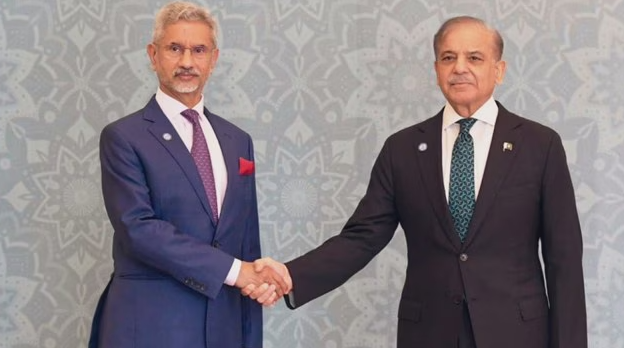A Kind of Hope: India-Pakistan Relations at the SCO Summit (GS Paper 2, IR)

Context: A Diplomatic Meeting
- The recent visit of India's External Affairs Minister S. Jaishankar to Pakistan for the Shanghai Cooperation Organisation (SCO) summit has sparked discussions about a potential thaw in bilateral relations.
- The atmosphere during Jaishankar's visit was notably warm and courteous, a significant shift from previous interactions characterized by tension and hostility.
A Shift in Diplomatic Tone
- Jaishankar's approach was marked by grace and dignity, maintaining India's positions on key issues while responding positively to the courtesy extended by his Pakistani counterparts.
- This diplomatic engagement indicates a possible reassessment of Pakistan's stance toward India amidst its own internal challenges.
Internal Challenges in Pakistan
Pakistan is currently facing considerable turmoil, including:
- Political Instability: Ongoing political strife has weakened governmental authority.
- Economic Struggles: High inflation and economic instability are causing widespread public discontent.
- Sectarian Violence: Rising sectarian tensions and repression by the military contribute to societal unrest.
Given this backdrop, the Pakistani government and military might feel compelled to stabilize the situation, prompting a reassessment of foreign policy, particularly regarding India.
Contrasting Visits: Bhutto vs. Jaishankar
- The difference between Jaishankar's visit and the behavior of Pakistan's former foreign minister, Bilawal Bhutto Zardari, at the previous SCO meeting in Goa is stark.
- Bhutto's abrasive demeanor reflected a more traditional, confrontational approach that has dominated Pakistan's diplomacy since the abrogation of Article 370 in Jammu and Kashmir in 2019.
- In contrast, Jaishankar's visit was characterized by a willingness to engage in private discussions and a notable absence of hostility.
- The warmth extended to him may suggest a growing acknowledgment within Pakistan that a less adversarial relationship could be advantageous.
Influencing Factors Behind Pakistan’s Stance
Several key factors are driving this potential shift in Pakistan's foreign policy:
- Economic and Political Turmoil: The need to focus on internal stability may overshadow the desire for confrontational politics with India.
- Pragmatism Under Sharif’s Leadership: The current government, led by Shehbaz Sharif and influenced by former PM Nawaz Sharif, appears to be adopting a more pragmatic stance. There is recognition that engagement with India could offer economic benefits and contribute to regional stability.
- India’s Growing Global Influence: As India asserts itself as a regional and global power, there is a realization in Pakistan that fostering cooperation may yield greater benefits than maintaining hostility.
A Balanced Approach: India’s Policy Towards Pakistan
India's approach to Pakistan has traditionally been influenced by three main schools of thought:
- Realists (Subedars): This group has advocated for a hardline, security-focused stance, particularly during the Modi administration.
- Liberal Institutionalists (Saudagars): They emphasize the potential for trade, economic ties, and cultural exchanges to foster peace.
- Constructivists (Sufis): This group advocates for dialogue and reconciliation, focusing on addressing historical grievances and building trust.
Given the current dynamics, incorporating liberal and constructivist perspectives into India’s policy could create a more balanced approach. This strategy would not only address security concerns but also explore avenues for cooperation, such as:
- Confidence-Building Measures: Initiatives that foster trust and understanding between the two nations.
- Trade Agreements: Economic collaboration that can benefit both countries.
- Cultural Exchanges: Programs that promote mutual understanding and respect among citizens.
Conclusion: The Path Forward
- The situation in Pakistan presents an opportunity for India to reconsider its approach.
- While remaining vigilant about security concerns, India can explore ways to shape developments in Pakistan positively.
- Incremental measures that promote cooperation could create a conducive atmosphere for meaningful dialogue, ultimately benefiting the region as a whole.
- With Jaishankar’s visit symbolizing a possible shift, there is a kind of hope for a more constructive and stable relationship between India and Pakistan.


